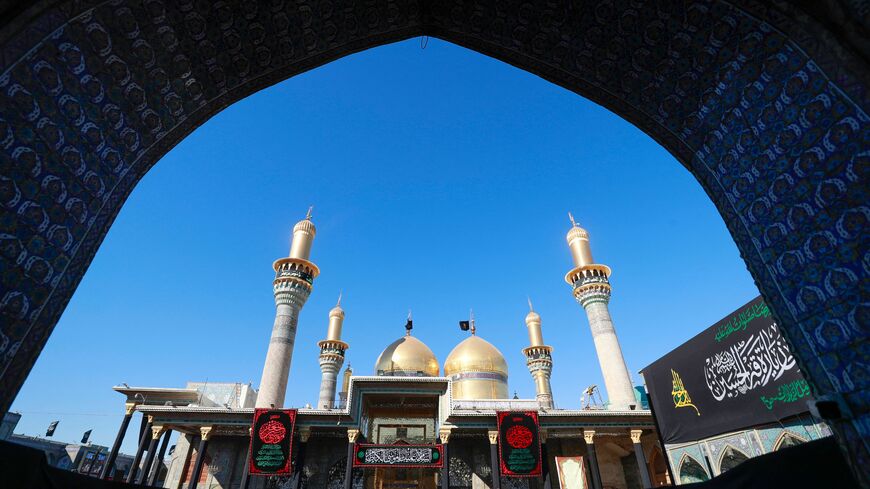MBC Media Group has announced a drama series about Mu'awiya bin Abi Sufyan, the first Umayyad caliph, during the upcoming Islamic month of Ramadan, set to begin in about 20 days. The Saudi media conglomerate's decision has faced massive criticism in Iraq and other countries with large Shiite communities, due to the Shiite belief that Mu'awiya was an enemy to Islam.
Iraq’s government media watchdog, the Communication and Media Commission, warned MBC Iraq, which is a part of MBC group, that the show went against the country’s regulations. Consequently, MBC Iraq announced that it will not broadcast the series. However, other MBC channels will broadcast it due to commitments with the producer. MBC is currently referring to it as "Mu'awiya," but the official name will be released before it airs. The series, directed by Tarek Alarian, cost nearly $100 million and took over two years to produce. It features several well-known Arab actors, including Lujain Ismail (playing Mu'awiya), Iyad Nassar (Imam Ali), Suhair bin Amara (Hind, Mu'awiya's mother) and Wael Sharaf (Amr Aas).
The controversial Shiite cleric Muqtada al-Sadr demanded that MBC halt the series. “Broadcasting such series is contrary to the new, moderate policies pursued by the brotherly country of Saudi Arabia,” Sadr tweeted Feb. 14.
Why this matters for Shiites
Mu'awiya was the first caliph of the Umayyad Caliphate, which ruled a large part of what is today the Middle East from 661-750 CE. He established Umayyad Caliphate in Damascus after a war with Imam Ali ibn Abi Talib, the first Shiite imam who was the caliph in Kufa, in southern Iraq. Imam Ali was assassinated in 661 AD and buried in nearby Najaf, which has become the heart of the Shiite religious institution, similar to the Vatican. Imam Ali occupies a similar authority and role for Shiites as St. Peter the Apostle does for Catholics. The enmity between subsequent Umayyad caliphs and Imam Ali’s children and grandchildren continued for about 100 years.
Given this history, many Shiites hold a lasting grudge against the Umayyads in general and Mu'awiya in particular. However, for the Sunnis, the Umayyad period is considered a part of glorious Islamic history.
Iraqi Shiites were outraged at the plans for the series, sparking concerns that it could ignite a new wave of sectarianism in the region.
The Iraqi Shiite TV channel Al-Shaaer announced that it would not air the Mu'awiya series and that it had started producing a rival series about Abu Lu'lu'a Firuz, a Persian slave who assassinated the second Islamic caliph, Umar ibn al-Khattab, in 644 AD. While Sunnis respect Umar as a religious and political leader, Shiites claim he was an illegitimate caliph.
Iraq’s government media watchdog, however, also sent a directive to Al-Shaaer against the series, stating that “licensed media organizations are prohibited from belittling, distorting, or denigrating the religious beliefs of other sects.” In response, Al-Shaaer confirmed that they will commit to the directive as long as MBC does not air the Mu’awiya series.
Iraqi militia Telegram channels also slammed Saudi Arabia and the MBC group, calling for a demonstration in front of MBC’s headquarters if they go ahead with plans to air it.
The headquarters building in Baghdad was attacked and burned in 2020 by pro-militia groups after the channel broadcast a documentary about a terrorist attack targeting the Iraqi embassy in Lebanon in 1980s, accusing the former head of the Popular Mobilization Units, Abu Mahdi Al-Muhandis, of leading the attack.
History as a weapon
During the last two decades, producing historical movies and series to be used against rival powers in the region has become common.
Iran, Saudi Arabia and Turkey in particular have produced dozens of dramas and TV series, in addition to documentaries, about Islamic history in order to glorify their nations and attack the rival powers in the region, not to mention the West.
Movies and TV series about Al-Hajjaj ibn Yusuf, Marwan ibn al-Hakam and Umar ibn al-Khattab, who are rejected by the Shiite, had raised their anger. And movies and TV series about Shiites like Imam Ali and Imam Hassan that narrate their life (and insult against their enemies, who are mostly respected by Sunnis), raised Sunnis’ discontent.
The Mu'awiya series has already woken up the sectarian conflict in the region that had been quiet in the last few years, particularly after the defeat of the Islamic State. Sufian Samarrai, the chairman of BaghdadPostPlus, slammed Shiite figures who oppose the series.
Faisal Al-Farhoud, a famous Saudi blogger, also expressed support for the series in a tweet. He praised Mu’awiya and asked, "Who are you, Muqtada al-Sadr, the bucket?”







